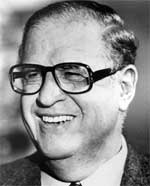EBAN (EE-buhn)
Israeli
diplomat and politician
Common clues: Abba
of Israel; Israeli diplomat Abba; "Voice of Israel"
author; Statesman Abba; “My People” author; “My
Country” author
Crossword
puzzle frequency:
4 times a year
Video: Egypt
Accepts United Nations Cease-Fire (1967)
Men and nations behave wisely once they have exhausted all the other alternatives. – Abba Eban
Abba Eban (born February 2, 1915, died November 17, 2002) was an Israeli diplomat and politician.

Born with the name Aubrey Solomon Meir in Cape Town, South Africa, Eban moved to England at an early age. He was educated at St Olave's Grammar School before studying Classics and Oriental languages at Queens' College, Cambridge. After graduating with a "Triple-Starred First", he researched Arabic and Hebrew as a Fellow of Pembroke College from 1938–1939. At the outbreak of World War II, Eban went to work for Chaim Weizmann at the World Zionist Organization in London from December 1939. A few months later he joined the British Army as an intelligence officer, where he rose to the rank of major. He served as a liaison officer for the Allies to the Jewish Yishuv of Palestine. Drawing on his linguistic skills, In 1947 he translated from Arabic a 1937 novel by Tawfiq Al Hakim(1898-1987): Maze of Justice: Diary of a Country Prosecutor.
Eban moved back to London briefly to work in the Jewish Agency's Information Department, from where he was posted to New York, where the General Assembly of the United Nations was considering the "Palestine Question". In 1947, he was appointed as a liaison officer to the United Nations Special Committee on Palestine, where he was successful in attaining approval for the partition of Palestine into Jewish and Arab segments—Resolution 181. At this stage, he changed his name to the Hebrew word Abba (however it was seldom used informally), meaning "Father", as he could foresee himself as the father of the nation of Israel. Eban spent a decade at the United Nations, and also served as his country's ambassador to the United States at the same time. He was renowned for his oratorical skills. In the words of Henry Kissinger:
"I have never encountered anyone who matched his command of the English language. Sentences poured forth in mellifluous constructions complicated enough to test the listener’s intelligence and simultaneously leave him transfixed by the speaker’s virtuosity."
His polished presentation, grasp of history, and powerful speeches gave him authority in a United Nations that was generally skeptical of Israel or even hostile to it. He was fluent in ten languages. In 1952, Eban was elected Vice President of the UN General Assembly.
Eban left the United States in 1959 and returned to Israel, where he was elected to the Knesset (the Israeli parliament) as a member of the Mapai party. He served under David Ben-Gurion as Minister of Education and Culture from 1960 to 1963, then as deputy to Prime Minister Levi Eshkol until 1966. Through this entire period (1959–1966), he also served as president of the Weizmann Institute at Rehovot.
From 1966 to 1974, Eban served as Israel's foreign minister, defending the country in the Six-Day War. Nonetheless, he was a strong supporter of giving away the territories occupied in the war in exchange for peace. He played an important part in the shaping of UN Security Council Resolution 242 in 1967 (as well as UN Security Council Resolution 338 in 1973). Eban was at times criticized for not voicing his opinions in Israel's internal debate.
His comment that "Arabs never miss an opportunity to miss an opportunity [for peace]," made after the Geneva peace talks in December 1973, is often quoted.
In 1988, after three decades in the Knesset, he lost his seat over internal splits in the Israeli Labour Party. He devoted the rest of his life to writing and teaching, including serving as a visiting academic at Princeton University and Columbia University. He also narrated television documentaries including Heritage: Civilization and the Jews (PBS, 1984), for which he was host, Israel, A Nation Is Born (1992), and On the Brink of Peace (PBS, 1997).
In 2001, Eban received the Israel Prize, his country's highest honor. He died in 2002 and was buried in Kfar Shmaryahu, north of Tel Aviv.
Abba Eban's brother-in-law is the late Chaim Herzog, the 6th president of Israel. Herzog's son Isaac Herzog is a minister in Israel's Knesset. Eban's cousin, Oliver Sacks, is a neurologist and author and his son, Eli Eban, is a renowned clarinetist who teaches at Indiana University. Eli has two children, Yael and Omri Eban. His nephew, Jonathan Lynn is a film-maker and script-writer known for satirical BBC shows Yes Minister and Yes, Prime Minister. Lynn recounts that the plot of an episode of Yes, Prime Minister, which involved the British Prime Minister bypassing his own Arab-centric bureaucracy by taking the Israeli ambassador's advice, was based on an actual incident narrated to him by Eban.
This article is licensed under the GNU Free Documentation License. It uses material from the Wikipedia article "Abba Eban".
|
|